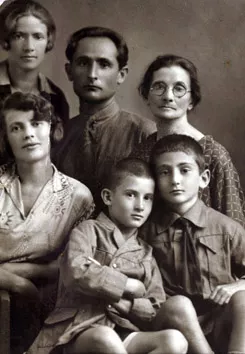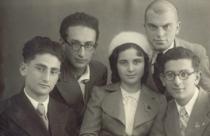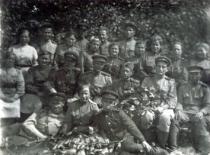Boris Molodetski and his relatives
This is my family. Sitting from left to right: my mother's sister Mary Khromaya, my mother sister Nechama's son Boris Valter and I. Standing from left to right: my mother Chaya Molodetskaya, my father Gersh Molodetski, my maternal grandmother Matlia Yeschina. This photo was taken in Odessa in 1930.
I was born in Odessa in 1921. I remember myself in a small damp room on the ground floor of a brick house in 10, Bolshaya Arnautskaya Street. We got along well with our neighbors. When in 1925 a three-bedroom apartment on the 2nd floor in our house got vacant a meeting of tenants decided to give it to us. My mother was a housewife. She was raising me. She never let me play with other boys in the street. She told me that they would teach me bad things. I was sitting on the balcony suffering terribly. My mother took me for walks always holding me by my hand. During such walks I learned to read on store signs. It was the second half of NEP and there were many colorful signs on private stores. My aunts Sheva and Mary didn't have children and were spoiling me a lot. They often made me clothes. They lived with grandmother Matlia and were our neighbors. My mother and father spoke Russian at home, but when they decided that there was something I shouldn't know they switched to Yiddish. I knew some words in Yiddish.
My father worked as an accountant in Tserabkoop on the corner of Pushkinskaya and Deribassovskaya Streets. He audited stores and shops. My father didn't have many clothes, but he kept them clean. At work he wore black over sleeves. I remember that for three years in a row he wore a khaki shirt, boots and trousers of thick fabric. It turned out that it was prison wardens' uniform and he managed to get one somehow. My father was a melancholic person. He had acting talents. When we had guests occasionally he used to read Sholem Alechem to them in Russian and Yiddish.
My parents were not religious. I was a convinced atheists and turned my head away when I passed by a church. We celebrated Soviet holidays at home, but never Jewish holidays. We lived a modest life, but we always had good food. My mother believed food was of the utmost importance. She could make do with whatever she had to wear, but she liked to eat heartily and loved to make food for us. Our standard lunch consisted of chicken broth with rice and a piece of chicken with garnish. She also cooked gefilte fish and dishes from matzah. However, she rarely cooked with matzah since we could only get it at the synagogue and at this period it had to be done in secret. She cooked on a primus stove. I was responsible for the stove: I had to refill kerosene, watch needle stocks and clean the head. I took the stove to the open staircase behind the backdoor, took the head and stretching my hands off the handrails cleaned the soot. Sometimes I had to go stand in line for kerosene at 5 o'clock in the morning. I used to stand 3-4 hours before I could buy 2 liters of kerosene.
At the beginning of World War II my father was to turn 50 a month later, but he received a subpoena and went to the registry office. Even younger men ignored such calls. When we were on the way back he said 'Tell mother there was nothing I could do to avoid it', but I knew that he didn't even try. At first he was sent to Mariupol and then to Moscow to excavate trenches and long-lasting fortifications. I and my mother evacuated to Alma-Ata (Kazakhstan). In August 1942 we received a letter from my father. He wrote that he was demobilized due to his age and was heading to the south looking for us. He settled down in Krasnodar where he worked as chief accountant in the all-union scientific research institute of tobacco and makhorka. Every day he went to the railway station hoping to see somebody he knew who could tell him about us and he finally managed. On that same day I heard on the radio that our troops left Krasnodar. In early 1944 when Krasnodar was liberated my mother wrote to this address and the woman that leased a room to my father replied. She said that when Germans came they ordered all Jews to come to a gathering point and threatened with execution to those who were hiding them. My father went there to not let down his hostess. She gave a jar of honey and warm socks. From the gathering point people were transported in mobile gas chambers. This was how my father perished in 1942.




















